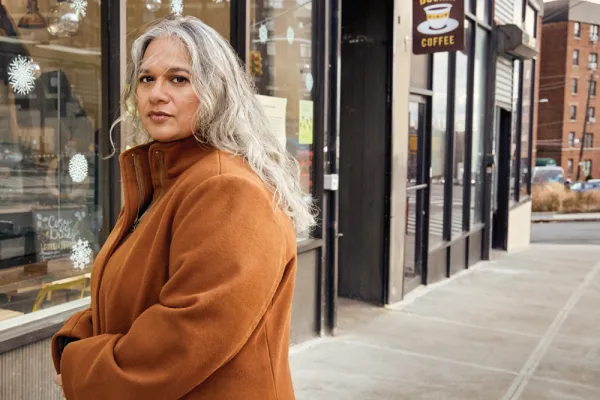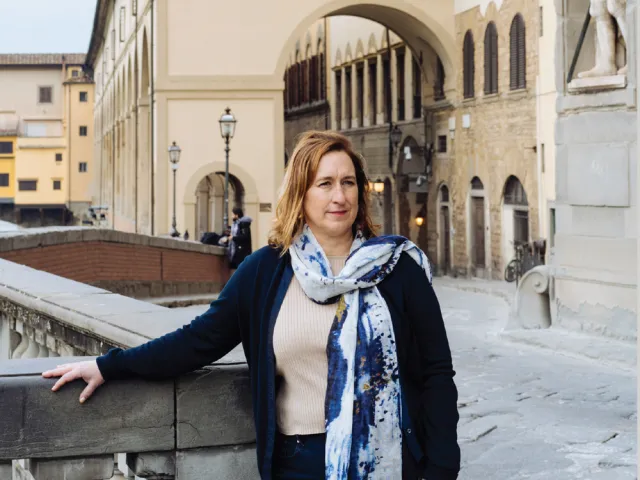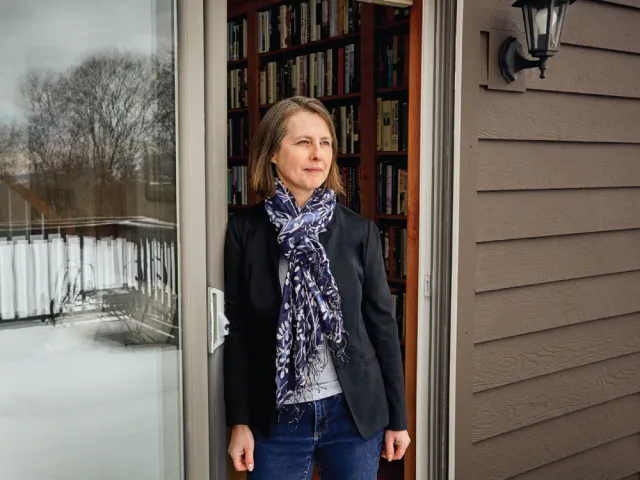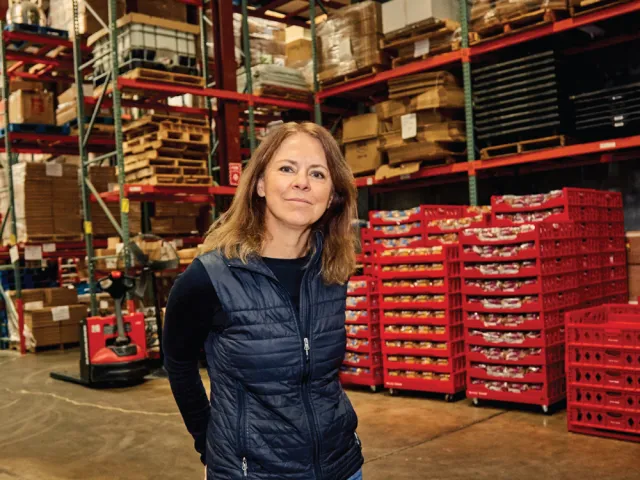Uncertainty on Main Street
Alum News
Published March 17, 2021
Fresh aromas wafted through the air each time the grinder whirred: a chocolatey-bold Harrar; then a perfumed, floral Yirgacheffe; next a fruity, tangy natural Sidama—all blending and forming the unmistakable smells that most people just call coffee.
I stood with Elias, my husband and business partner, where eight years ago we opened our first coffee shop, Buunni Coffee, in northern Manhattan. We were a couple of weeks into the pandemic, and though officially our four cafés could stay open as “essential businesses” under New York law, we knew the responsible thing was to temporarily close our shops. We thought it would be for two weeks. We surveyed the café and started gathering the perishables. There I was, with a massive cooler, hawking Hudson Valley milk on the sidewalk. “This is amazing milk. Anyone want some free milk?” Most people stopped and took a gallon.
Over the next several days, I wondered why it was that thousands of small businesses like ours were making decisions—affecting the health and well-being of our staff, our neighborhood and beyond—completely on our own. One night after our young daughters were in bed, Elias and I scribbled furiously, trying to calculate how long we could pay our employees while our business was closed. At most, we concluded, two weeks. We heard little of substance from city, state or national leadership to guide us.
Batted around like pingpong balls across the political spectrum, small businesses occupy a special place in the American imagination. Main Streets and mom-and-pop shops are invoked with sugary nostalgia in stump speeches, while the government policies and ideology that underpin our economy hand over ever-increasing wealth and power to the largest of corporations. Small businesses are taxed orders of magnitude more than our large-business counterparts. Yet almost every American I’ve spoken to supports their small, local businesses, and the pandemic has been no exception. Countless people—many reeling financially themselves—have stepped up in huge ways for small businesses. We’ve experienced this astounding generosity firsthand: A customer provided free housing for a Buunni barista, a couple gave an unsolicited grant, others bought gift cards and holiday presents in multiples, many customers tipped lavishly into our Venmo tip jar. We received an abundance of email love notes.
And though we deeply appreciated the support and solidarity from our community, we also knew it was unfair for customers to shoulder this burden. Unfortunately, when government help came in the form of the Paycheck Protection Program (PPP), its implementation was clumsy and the rules were unclear. The smallest of enterprises and the most vulnerable among us were facing utter devastation, and we were shocked by the indifference shown by those who had the most power to help. For our employees—most of whom were pursuing other plans and dreams—lack of adequate financial support and looming rent forced them to make difficult choices. Among our team were students, musicians, actors, even a professional juggler, but some had to set their plans and dreams aside and move back in with their parents or with other family, away from the enormous burden of New York City rents.
In an effort to keep our business going, my husband and I tried everything we could think of. We negotiated with the landlords of our café spaces, but we had to search for guidance—what should we even ask for when the path ahead was so uncertain? To help us navigate the notoriously unlevel playing field between small-business tenants and commercial landlords, we found pro bono city-funded legal representation—only to learn that the program was ending due to budget cuts. We also submitted a claim to access our small-business interruption insurance, but discovered it would only cover us if the word “pandemic” was specifically mentioned in the policy, which it wasn’t. We filled out reams of paperwork for loans, grants, pitches and competitions, and swallowed our discomfort with disclosing all of our financial information, since there was no assurance of privacy or security. Finally, fueled by adrenaline (and caffeine), we decided to reinvent ourselves, as many other businesses have. We ramped up a coffee subscription program, started preparing take-home Ethiopian meals and intensified the hustle online. These initiatives kept our business and our hopes afloat.
A year after the pandemic started in the United States, the country stands out globally as the worst affected. Among industrialized nations, it also stands out for providing the least support to buffer its citizens against the economic ramifications of lockdowns, business closings and high unemployment. For my business, this means we start 2021 stretched financially and emotionally, and unsure how long we can or should wait it out. The pandemic has been a stark reminder of what might just be the entrepreneur’s mantra: Norms don’t protect us, and leaders don’t protect us—we can only rely on ourselves and must take care of one another. In search of some camaraderie and connection, I reached out to some Smith small-business owners to learn how they were faring.
Following are excerpts of our conversations.
Elizabeth Namack ’91, in Italy. Her personalized tour business has taken a big hit in the past year, but she is optimistic about the future. Photograph by Sofie Delauw
‘Still Finding My Way’
ELIZABETH NAMACK ’91
Smith major: Art history, Italian minor
Business: My Italian Treasures, Florence, Italy
What we offer: Personalized tours and itineraries for travel in Italy Founded: Started guiding in 2010
How did you get started in the tourism industry?
I fell into tourism. I did city guiding in Florence as a licensed guide, then I started a small tour operation, which curates specialized itineraries around Italy. When I was at Smith, I did junior year abroad in Florence, and it changed my destiny. I moved to Italy in 1992, and I’ve been in Tuscany and Florence ever since. I ended up marrying an Italian, and have a son who’s 12.
Travel and tourism have taken such a big hit. Tell us a bit about your experience.
In Italy, they literally called it a lockdown. For almost two months the only thing we could do was walk down to our little grocery store. In 2019, I did about 250 personal tours, and 2020 was looking to be a stellar year. I did two tours in February 2020, and that’s it. That’s all.
Was there any government help for small businesses like yours in Italy?
There are some programs, but they came late. For most of this time, I haven’t been able to apply for U.S. relief programs, nor Italian relief programs. Just recently, though, I found out that I was approved for some funding through Italy’s Cultural Ministry.
What’s your biggest worry for your business? What keeps you up at night?
I’m worried about the economic consequences. Florence was too dependent on tourism. The mayor even indicated that since they weren’t getting revenue from hotel taxes, he was going to turn off the city lights. I also worry about the children: They’re not going outside; they’re not learning to interact with other people—too much online schooling and video games. Italy made a big effort to open schools in September, but now we’re back online again. The consequences for children will be felt down the road.
How has the pandemic affected your personal life?
It’s been psychologically taxing. My child’s learning from home, my husband’s working from home, but I’m also trying to just enjoy the simple things, which is something that Italy teaches you.
How do you feel about the future?
I do think tourism will return. I hope it doesn’t return the same way as before. Mass tourism had detrimental side effects, particularly in art cities like Florence. I hope it returns in a more sustainable fashion. People won’t want to join a 30-person tour; there will be more private tours, which is what I specialize in. My philosophy of travel is that it should be authentic, sustainable, fun, educational and local. The question is when. I have to decide what I want to do until then. I’m still finding my way.
Lilian Rosenstreich ’89, in Pennsylvania, has been inspired by people’s willingness to take care of one another. Photograph by Beth Perkins
‘I’m Stretching Myself’
LILIAN ROSENSTREICH ’89
Smith major: Art and art history
Business: Endless Mountains Publishing Company/Kalaniot Books, Susquehanna, Pennsylvania
What we offer: Children’s books exploring Jewish culture and history
Founded: 2018
Number of employees: Rosenstreich and her husband
How has the pandemic affected your business?
I’ve found I’m more comfortable with this virtual land. I’m an introvert, and I’m less intimidated with a screen between myself and others—at the conferences especially, because now the big honcho publishing people and me, we’re all little boxes in the same Zoom room. So, there’s a democratization that’s positive./p>
We had planned four books. For publishers, our list of books works together to form a message or theme. We wanted to show the incredible diversity of Jewish people and the Jewish experience, but because we were only able to publish one book, that theme of diversity doesn’t really come through. It will take a lot longer for us to get our message out.
You had just started a new business when the pandemic hit.
Our business was brand new. Our plan was to interact with people directly—to go to synagogues, go to events. We wanted to travel and meet people. Showing our books to our audience and engaging with them directly was a big part of our plan. We had even planned to start in Florida and drive up the East Coast with our books. Well, that’s not happening.
Is there anything you think would have been helpful, in terms of policies either at the local level or national level, to help you through this?
I’ve just been trying to get things done. One thing, though: In publishing, Amazon is just this behemoth, and it is impossible to work against them. The economics of it are just abusive. I’m not a policy maker; I have no idea what else went into those decisions, but it’s created an unjust situation.
Is there anything you are doing now in the business that you couldn’t have imagined doing a year ago?
We’ve tried to implement an e-commerce platform. This is something very foreign to me. It is difficult, but it’s interesting. I’m stretching myself. Numbers are not my friend, but somehow I’m doing the accounting. While I was learning it, it was horrific. Now, I’m doing it. I actually like accounting.
How do you feel about the future?
I’m hopeful. When you look back at the pandemic of 1918, you see this country and the world have had difficulties before. We’re resourceful people. The whole concept of keeping each other safe is a wonderful message. People are caring for each other. The idea of quarantining, you’re giving of yourself to keep people safe. That’s amazing, and a lot of this country did it. I am totally impressed.
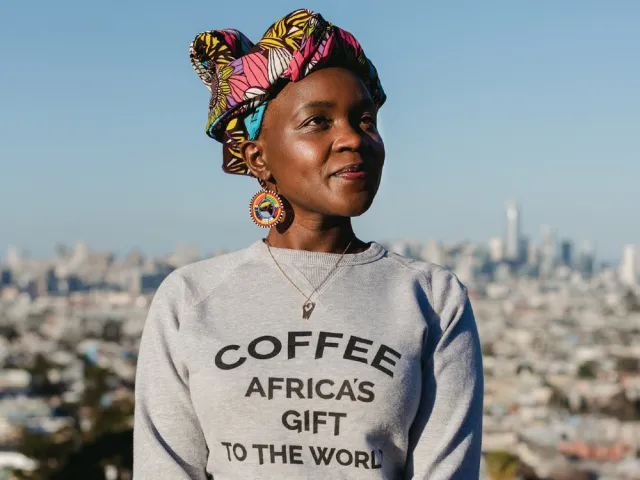
Margaret Nyamumbo ’11, in San Francisco, has been frustrated by the lack of government support for her fellow small-business owners. Photograph by Marissa Leshnov
‘We Changed Our Business Model’
MARGARET NYAMUMBO ’11
Smith major: Economics and statistics
Business: Kahawa 1893, Kisii, Kenya, and San Francisco, California
What we offer: Retail and wholesale specialty Kenyan coffee
Founded: 2018
Number of employees: 3 full time, 2 part time
How has the pandemic affected your business?
We completely changed our business model. Initially we were selling to other coffee companies and offices. Offices closed down, so we started going directly to consumers. It’s much more time-consuming, more resource-intensive, and it forced us to find creative ways to engage with our community in a more authentic way. We partner with others who can feature our coffee and share the story. And it coincided with an upsurge in activism and engagement with the Black Lives Matter movement. We wanted to respond to that and encourage people to use our platform to engage directly with ongoing social and cultural issues in the country.
We work directly with women in Kenya, and we have a tipping mechanism. If consumers like a cup of coffee, they can tip virtually. We match those tips and send them back to the farmers. During this period when Kenya was closed down, women had extra income coming in. One of the headwinds I’m expecting is we might have a glut that’s going to affect coffee prices.
What brought you into coffee?
I grew up on a coffee farm in Kenya. I’m a third-generation coffee farmer. My region in Kenya was the first where they allowed locals to start experimenting with coffee. So, my grandfather started a farm and my grandmother used to roast it in a pan and grind and sell it at the market. She still does that. The reason Kenya is a tea-drinking nation is because we were banned from drinking coffee. We’re now reengaging with coffee and building a coffee culture.
Has your business been helped by any government policy or other program?
No. I’m not a U.S. citizen, so I don’t have access to the government programs here. In Kenya there just hasn’t been a response from the government. But, reading about the Paycheck Protection Program (PPP), and hearing from my friends, I know a lot of the funds ended up going to bigger businesses that had banking relationships, lawyers and the resources to get the funds.
It would have been helpful for the support to come in a more automatic way for the smallest businesses, something like the stimulus check.
What’s the biggest worry for your business? What keeps you up at night?
The logistics became more challenging. Limitations around when we can roast, the number of people who can be in that space at the same time, shipping delays and price increases made things difficult.
Is there anything that you’re doing now in the business that you couldn’t have imagined a year ago?
The way that we accelerated. We adopted an e-commerce component that could have taken five years worth of work, but I compressed it into three months because we had to become an e-commerce company overnight.
How has the pandemic affected your personal life?
It’s been challenging and lonely not gathering and hanging out with friends. I’m a very outgoing person, so it’s taken a toll on me. I’ve also been worried about my parents because they’re older and they’re back home. I’ve seen so many people affected, losing their jobs, businesses struggling. My printing company just told me they did not have any income for six months. Hearing those stories is depressing, too.
How do you feel about the future?
We have the first female vice president in Kamala Harris. So, that’s a little bit of a light for me. And the vaccine is coming. Having waded into this new world, I think we’re more comfortable with adversity, so when things improve it’s going to seem like skiing downhill. It’s going to feel easier.
Kim Salisbury ’80, from Rochester, NY, is grateful that she has been able to keep her employees working. Photograph by Beth Perkins
‘We’re Going to Be OK’
KIM SALISBURY ’80
Smith major: Economics
Business: Lanovara Specialty Foods, Rochester, New York
What we offer: Wholesale specialty foods and bakery
Founded: 1920; Salisbury and her husband purchased the business in 2007
Number of employees: 22 full time, 2 part time
How has the pandemic affected your business?
Our people were being mobbed when they delivered bread to the grocery stores. We had to accompany them and print signs about keeping a distance. We started paying extra and making sure people weren’t doing deliveries alone. It was unreal.
Has your business been helped by any government policy or other program?
We got the Paycheck Protection Program (PPP) loan. It helped us keep our staff and offer paid leave to those who needed it. We didn’t have to lay off our employees. Most of our employees
earn an hourly wage, so it was hard when the unemployment program was offering more than what they earn by working. All our staff kept working, and they seemed happy to do it. While people were being told to stay home because of the pandemic, somebody had to stock the shelves at the grocery stores and deliver the food. We were all relying on some people to work through it all.
What’s your biggest worry for your business? What keeps you up at night?
I think we’re going to be OK because we have a diversified business. Some parts of the business—for example, food service, which supplies college campuses—are down, but our retail business to grocery stores and supermarkets is up. I am more worried about our employees getting sick. We’re pretty isolated at our factory and bakery. People are wearing masks, but I still worry about our employees.
Is there anything that you’re doing now in the business that you really couldn’t have imagined a year ago?
I didn’t imagine I would spend so much time in the grocery stores. Or that there would be so much paperwork, documentation and plans related to COVID. That was a lot.
How has the pandemic affected your personal life?
The surprise has been family time with our grown children, who came home and stayed with us. Having everyone in the house together—that part of it has been special. We’re planning my daughter’s wedding for 2022. I haven’t really spent a lot of time contemplating what the future will bring beyond that.
This story appears in the Spring 2021 issue of the Smith Alumnae Quarterly.
Sarina Prabasi ’95, pictured outside her café Buunni Coffee in New York City. “We’ve tried everything to stay afloat,” she says. Photograph by Beth Perkins
